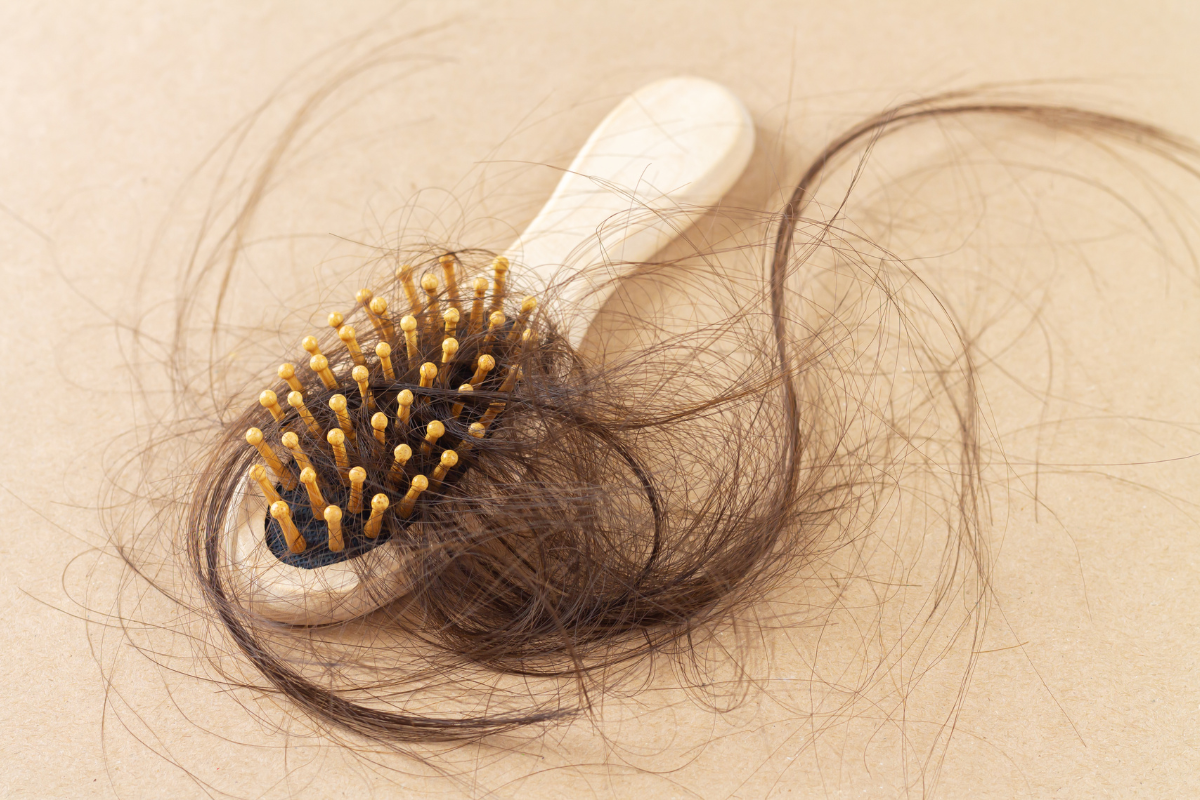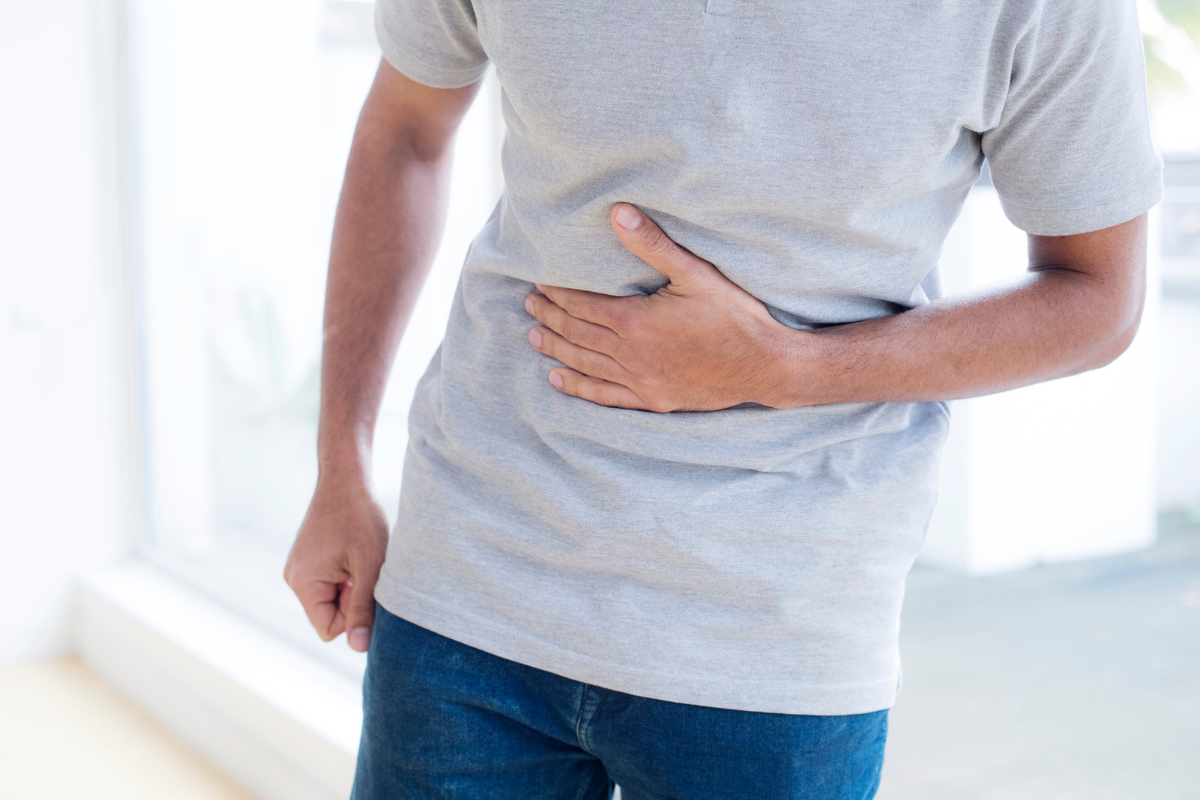Gut health, hair loss & Collagen

Gut health, hair loss & Collagen
The gut-hair connection: Are imbalances in the gut the root of alopecia (hair loss)?
Many people live a long time with hair loss. Sometimes with spontaneous regrowth, but often when times can be more challenging the hair starts to fall out again. Often the cause of hair loss can be due to your gut health and there is a connection between gut health and hair health!
Many people do not know that problems with the stomach and intestines can be the root of so much, everything from hair loss to skin health. But by healing your gut, you can avoid thinning hair!
It's amazing how much gut health can affect other parts of the body, including your hair, which is why it's important to address your gut health first to get your hair back.
When it comes to hair loss, there are usually many factors that can cause hair loss: genetics, hormones, stress and poor hair care routines. But more and more research shows that your gut health can also be crucial for healthy and thick hair without hair loss. The health of your gut can affect the health of your hair. In this article, we will delve into the connection between gut health and hair health.
Collagen and hair health
Collagen can promote healthy hair in a variety of ways. First, your body may be able to use the amino acids in collagen to build hair proteins and strengthen the skin that contains your hair roots. It can also prevent hair follicle damage and premature graying of hair. Collagen can also heal a leaky gut and prevent foreign substances from entering the bloodstream that can cause everything from hair loss to other autoimmune reactions.
The link between gut health and hair health
Intestinal flora and nutrient absorption
The gut microbiome (intestinal flora) is the core of our digestive system, a diversity of bacteria and microorganisms that help digest food and synthesize important nutrients. A balanced intestinal flora ensures optimal nutrient absorption. Since healthy hair requires nutrients such as vitamin E, vitamin A and vitamin D , biotin (vitamin B7), folate (vitamin B9, folic acid), cobalamin (vitamin B12) and minerals such as iron and zinc, any imbalance in the gut can jeopardize hair health.
There are people who suffer from hair loss who already eat a fairly healthy diet, but they are still nutritionally deficient. This sets off alarm bells, and that's when it's likely that digestive issues are at the heart of their nutritional deficiency.
Inflammation
An unhealthy gut can lead to systemic inflammation. Did you know that over 70% of the immune system is located in the gut? Chronic inflammation has been linked to conditions such as telogen effluvium, a form of temporary hair loss. Telogen effluvium is a reaction where the hair follicles enter a resting phase. It can be caused by factors such as stress, nutritional deficiencies or hormonal changes, for example after childbirth. Although this condition is frightening, it is usually not permanent.
And since alopecia areata is an autoimmune disease, inflammation adds fuel to the fire and can worsen hair loss. In alopecia areata, the reaction occurs only in the skin. A kind of inflammation forms in the deep layers of the skin, which leads to hair falling out. By promoting inflammation, an unbalanced gut can indirectly affect hair health.
Intestinal permeability - leaky gut
I'm sure by now you've heard of leaky gut syndrome, which is a condition where the intestinal lining becomes permeable, allowing undigested food particles, bacteria, and toxins to enter the bloodstream. This can trigger autoimmune reactions through a concept called molecular mimicry* . Sometimes the body can accidentally target hair follicles, leading to conditions like alopecia areata.
* A process whereby the structural properties of an introduced, foreign molecule imitate or simulate the host's own molecules. Direct mimicry allows a viral protein to bind directly to a normal substrate instead of the normal, homologous ligand. Immunological molecular mimicry usually refers to what is called antigenic mimicry and is determined by the properties of the antibodies that are mobilized against different epitope variants on the viral protein.
Probiotics, prebiotics and hair health
A diet rich in probiotics and prebiotics can help maintain a healthy balance in the gut microbiome (intestinal flora). Probiotics are beneficial bacteria, and prebiotics are the fibers that feed them.
Probiotics
Probiotics are found in fermented foods such as yogurt, kefir, sauerkraut and kimchi and can help increase the beneficial bacteria in the gut, which can promote better nutrient absorption and reduce inflammation.
Prebiotics
Foods such as garlic, onions and bananas are excellent sources of prebiotics. They help feed the good bacteria and ensure a balanced intestinal ecosystem. Even a dietary supplement with collagen, prebiotics and glutamine can benefit your intestinal inflammation.
Specific gut bacteria linked to alopecia
Did you know that the bacteria living in your gut can be linked to hair loss? Recent studies have increasingly emphasized the potential link between an imbalance of gut bacteria and alopecia, particularly alopecia areata, an autoimmune condition that causes the hair to fall out in small patches.
1. Lactobacillus and bifidobacterium
These are among the most studied probiotic bacteria and have shown promise in promoting hair health. They are known to reduce systemic inflammation, which may indirectly benefit those suffering from hair loss. One study showed that oral administration of Lactobacillus and Bifidobacterium strains improved hair growth and hair density in mice.
2. Escherichia coli (E. coli)
Some strains of E. coli are harmful and can cause digestive problems. Research has shown that people with alopecia areata had higher amounts of E. coli in their gut than those without the condition. This suggests a possible negative relationship between E. coli overgrowth and hair health.
3. Fusobacteria
Another bacteria found in higher amounts in people with alopecia areata is fusobacteria. Although the specific role of this bacterium in hair loss is not entirely clear, its abundance in people with alopecia suggests a potential link.
4. Reduced bacteroides bacteria
On the other hand, individuals with alopecia areata have been shown to have reduced levels of bacteroides bacteria. These bacteria play an important role in maintaining gut health and reducing inflammation, suggesting that their reduced presence may harm hair health.
The 3 P's: probiotics, prebiotics and polyphenols
A diet rich in probiotics, prebiotics and polyphenols can help maintain a healthy balance of gut flora. Probiotics are beneficial bacteria, prebiotics are the fibers that feed them, and polyphenols inhibit the growth of harmful bacteria and keep the immune system in check.
Found in fermented foods such as yogurt, kefir, sauerkraut, and kimchi, probiotics can help repopulate the gut with beneficial bacteria, potentially promoting better nutrient absorption and reducing inflammation. A word of caution, not everyone's gut is ready for fermented foods, so if you have a reaction after eating these foods, it may be a sign of imbalances that need to be addressed before eating these foods.
Prebiotics are foods such as garlic, onions and bananas. They help feed the good bacteria and ensure a balanced intestinal ecosystem. It is best to eat a variety of these foods daily.
Polyphenols, naturally occurring compounds found in plant foods such as fruits, vegetables and tea, play a critical role in promoting a healthy gut. They promote the growth of beneficial bacteria, inhibit harmful bacteria and support the immune system by modulating the composition of intestinal bacteria. Polyphenol-rich foods include berries, apples, cherries, spinach, walnuts, cloves, and green tea.
Tips for a gut-friendly diet
1. Varied diet
A varied diet rich in different foods provides a wide range of nutrients and promotes a diverse gut microbiome* (intestinal flora).
*Microbiome - Microorganisms are organisms that are invisible to the naked eye, such as bacteria. The word microbiome is used to describe all the microorganisms in a certain environment. It can also be used to describe the combined genetic mass of all microorganisms in a certain environment. Microbiomes are everywhere, for example in and on the human body, on plants, in the soil and in the oceans.
2. Limit ultra-processed foods (whole and semi-processed foods)
Ultra-processed food can disturb the intestinal balance. Instead, focus on whole, natural foods. Simply eat raw materials and skip whole and semi-finished products in your everyday diet to optimize your gut health.
3. Stay hydrated
Water is essential for digestion and nutrient absorption.
Although hair loss can be affected by many factors, gut health should not be overlooked. By caring for the gut and maintaining a balanced microbiome (gut flora), your body has the best conditions to promote healthy hair growth. And by addressing the root cause of your hair loss, you're much more likely to have better hair health in the long run.







